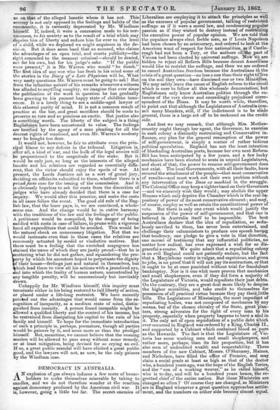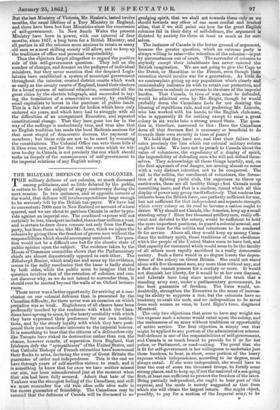DEMOCRACY IN AUSTRALIA.
AN explosion of gas always induces a few score of house- holders to make themselves miserable by taking to candles, and we do not therefore wonder at the reaction against democracy produced by the American civil war. It is, however, going a little too far. The secret enemies of Liberalism are employing it to attack the principles as Well as the excesses of popular government, talking of restricted suffrage as if it were-a moral law, and condemning popular passion as if they wished to destroy instead of restraining the executive power of popular opinion. We are told that the populace always elect feeble men, as if Louis Napoleon had been chosen by an aristocracy, and ordered to look at the American want of respect for free nationalities, as if Castle- reagh had not been a Tory, or the authors ofttlin pact of Vienna had been elected by universal suffrage. Now we are bidden to reject all Reform Bills because decent Amerikans would like to restrict the suffrage, and then we are ordered to cancel Australian freedom because the Australians iA the crisis of a great question—no less a one than their right t67ive on the soil v own—have dismissed one or two Ministries. We may safely leavethe cause of English reform to the recoil which is sure to follow all this wholesale denunciation'; but Englishmen only know Australian politics through the co- lumns of the very clever and exceedingly prejudiced corre- spondent of the Times. It may be worth while, therefore, to point out that although the Legislatures of Australia com- mit many blunders, still, if the indictment is to be nTide general, there is a large set off to be reckoned on the credit. side.
And first we may remark, that although Mrs. Mother- country ought through her agent, the Governor, to exercise in each colony a -distinctly restraining and Conservative' in- fluence, any plan for the general resumption of the power of self-government, is simply a matter of rather tedious political speculation. England has not the least intention of blockading Australian ports, because her own next Reform Bill has been anticipated by a few years, and a few lucky mechanics have been elected to seats in unpaid Legislatures, and short of that, the power to resume self-government does not exist. The local Governments, with all their faults, have secured the attachment of the people—that most conservative of results—and must work out their own problem without any intervention of the Deus ex machind in the struggle. The Colonial Office may keep a tighter hand on their Governors —and we sincerely wish they would ; may abolish the upper Houses which only deprive the Chamber which is the real di- pository of power of its most conservative element ; and may, of course, employ as well as retain the constitutional power of veto. But there is only one event which would justify the suspension of the power of self-government, and that one is believed in Australia itself to be impossible. The best Australians declare that the idea of repudiation so sedu- lously ascribed to them, has never been entertained, and challenge their calumniators to produce one speech having that tendency, one pledge to give a vote in that direction, one morsel of testimony that any influential politician,, no matter how radical, has ever expressed a wish for so dis- graceful a course. We quite admit that a repudiating colony is an evil England could not patiently endure, but the fact that a Marylebone vestry is vulgar, and capricious, and given to jobs, is no proof that it will not pay its contractors, or that it ought to be at once punished without trial for fraudulent bankruptcy. Nor is it one whit more proven that mechanics and small shopkeepers, even if they did form a majority of the Legislature of 'Victoria, would repudiate their just debts. On the contrary, they are a great deal more likely to despise the higher moralities, and take credit to themselves for possession of all practical virtue because they pay theinlittle bills. The Legislature of Mississippi, the most impudent of repudiating bodies, was not composed of mechanics 14 any means, but of the chosen chivalry of the State, great plan- ters, strong advocates for the right of every man to his property, especially when property happens to have a sbul in it. The only act of open repudiation of a public debt Which ever occurred in England was ordered by a King, Challis II., and supported by a Cabinet which contained blood as ,pure as the Howards. The fact is that the Legislature of. Vic- toria has some working men and small shopkeepers; and rather more, perhaps, than its fair proportion, but it has also men of undoubted wealth and respectability. Three members of the new Cabinet, Messrs. O'Shanassy, Haines, and Nicholson, have filled the office of Premier, and may claim a social grade at least as high as that of the doctor who, a hundred years ago, was the hope of the English Tories' and the "son of a working weaver," as he called himself, who is to-day, and will be a hundred years hence, the re- gretted chief of the entire nation. But these Ministries are changed so often ? Of course they are changed, as Ministers are in.,..gland whenever a great question approaches settle- ment, and the numbers on either side becomc almost equal. But the last Ministry of Victoria, Mr. Healee's, lasted twelve months, the usual lifetime of a Tory Ministry in England, and there have been but four Ministries since the concession of self-government. In New South Wales the present Ministry have been in power, with one interval of four months, since 1857, a long term for a British Ministry, and all parties in all the colonies seem anxious to retain as many old men as a most shifting society will allow, and so keep up the traditions of office and personal responsibility. Then the objectors forget altogether to regard the positive side of this self-government question. They tell us the number of changes, and descant on the pedigree of individual ministers, but they never mention that the despised Legis- latures have established a system of municipal government throughout the interior, created district courts which work as easily as the county courts of England, taxed their electors for a broad system of national education, connected all the great cities by the electric telegraph, and succeeded in lay- ing the foundation of a conservative society, by enabling small capitalists to invest in the purchase of public lands. This is a fair share of measures for bodies which have only endured six years and which have had to struggle with all the difficulties cl an unorganized Executive, and repeated constitutional change. That they have gone too far in the way of the suffrage is undoubtedly true' and true also that an English tradition has made the local Radicals anxious for that most stupid of democratic decrees, the payment of members ; but these evils are not to be cured by. resuming the constitutions. The Colonial Office can veto these bills if it likes even now, and for the rest the scene which we wit- ness to-day in Canada, is not precisely the one which should make us despair of the consequences of self-government to the imperial relations of any English colony.































 Previous page
Previous page